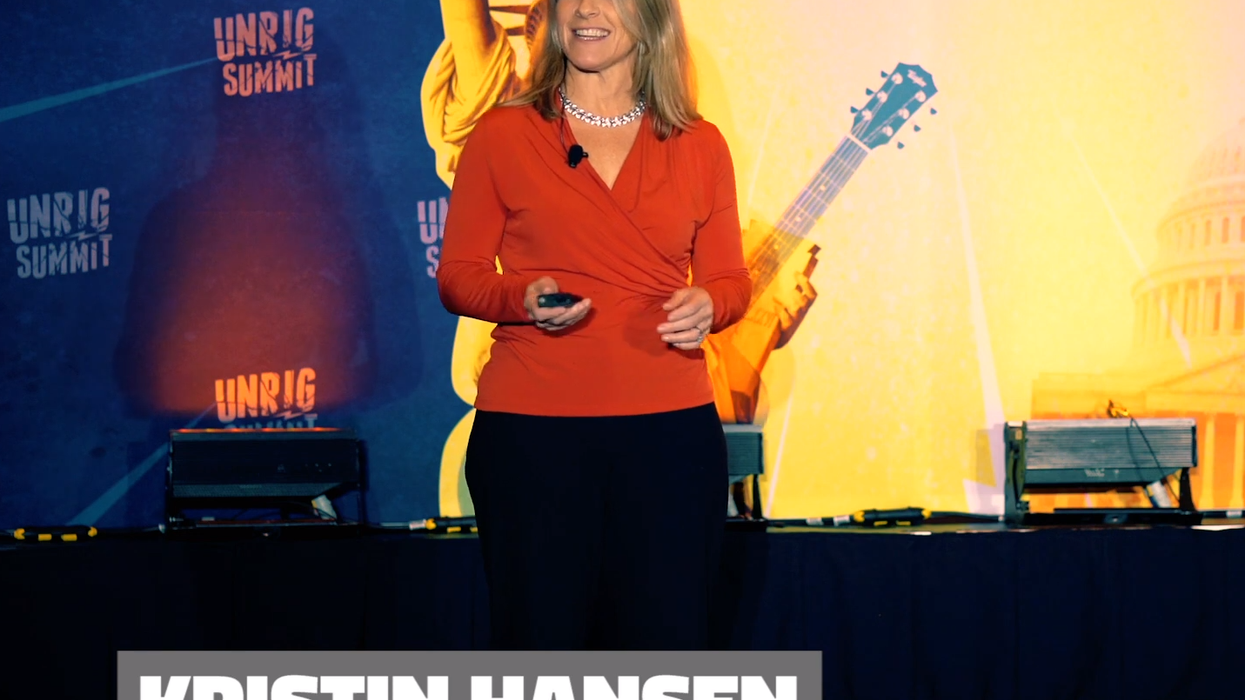After earning a bachelor's and two master's degrees from Stanford, Kristin Hansen spent nearly two decades at Silicon Valley software startups and in executive roles at both IBM and Intel. While teaching at Stanford's business school, she gave up the corporate life last year to become the founding executive director of the Civic Health Project. Her answers have been lightly edited for clarity and length.
What's the tweet-length description of your organization?
We aim to reduce polarization and create healthier civic discourse in our citizenry, politics and media. We partner with academics and practitioners to design and execute projects that deliver improvements in rationality, empathy and decision outcomes for a healthier democracy.
Describe your very first civic engagement.
As a high school senior, I represented my local Rotary chapter at California Girls' State. After serving as the Whig Party leader there I was elected as one of two senators to represent California at Girls Nation in Washington. These back-to-back, immersive experiences of civic learning set me on a lifelong path of political study, inquiry and action.
What was your biggest professional triumph?
My happiest professional moments have involved bringing people together across diverse opinions, perspectives and priorities. The challenge is to define an elevated vision and purpose that everyone can rally around, setting personal agendas aside. In the private sector, this typically means convincing people to unify around a plan to build a better product, generate more revenue or delight more customers. In the nonprofit sector, we can articulate similarly bold, elevated ideas that inspire us to overcome our differences and pursue better societal outcomes for all. I firmly believe we can transcend this current, hyper-polarized chapter in American history and embrace a shared obligation to nurture our fragile democracy back to health.
And your most disappointing setback?
I wish I had applied to work at Zoom Videoconferencing back before the IPO! Amazing technology, fantastic company. I am a passionate believer in the power of videoconferencing to transcend distance and connect people, both personally and professionally. Civic Health Project is proud to sponsor Mismatch, which uses videoconferencing to connect middle school and high school classrooms across the U.S. to engage in respectful civil dialogue across distance and divides.
How does your identity influence the way you go about your work?
Having spent many years in marketing roles in the tech industry, I'm now applying these professional lenses to the challenges of reducing polarization and improving civil discourse. At Civic Health Project, we are exploring ways to harness technology, marketing and social media in support of depolarizing interventions. For example, we host an online clinic full of simple, everyday tools individuals can use to reduce their own polarizing attitudes and behaviors. And we invest in innovative technology projects, such as one being spearheaded by team members at the Center for Humane Technology, which aims to offer YouTube users the option to choose less polarizing, radicalizing content than what is all too frequently served up by YouTube's default recommendation engine.
What's the best advice you've ever been given?
Keep your options open. My mother told me that, back when I was still single. I eventually failed to heed her advice!
Create a new flavor for Ben & Jerry's.
Civanillaty? Mis-Matcha? I'll admit I also thought of Impeach Cobbler, but that's way too polarizing.
What is your favorite political TV show or movie?
This will sound cliché, but just the other night I overheard a TV retrospective about "The West Wing" and it made me feel briefly nostalgic for both the show and the era. Season after season, the show portrayed characters who — in the main — fulfilled their civic roles not with cynicism or irony, but with honor and integrity. As many have noted, it was a "love letter" to American democracy.
What's the last thing you do on your phone at night?
Play Boggle. I'm hopelessly addicted, even though my scores have recently flatlined.
What is your deepest, darkest secret?
I voted for Arnold Schwarzenegger. For a bodybuilder, he was a pretty good governor of California.




















Trump & Hegseth gave Mark Kelly a huge 2028 gift